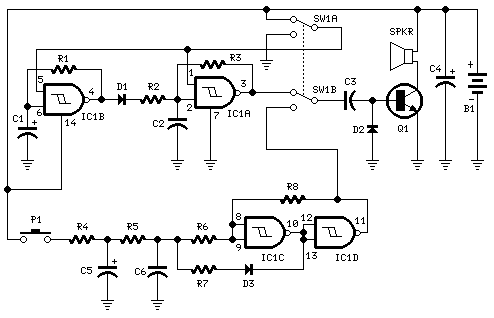One-IC two-tones Siren
Double tone Police sound
Single tone old ambulance sound
Circuit diagram:
Parts:R1,R3___470K 1/4W Resistors R2______680K 1/4W Resistor R4_______82K 1/4W Resistor R5______330K 1/4W Resistor R6_______10K 1/4W Resistor R7_______33K 1/4W Resistor R8________3M3 1/4W Resistor C1,C5_____10µF 25V Electrolytic Capacitors C2,C6_____10nF 63V Polyester Capacitors C3_______100nF 63V Polyester Capacitor C4_______100µF 25V Electrolytic Capacitor D1-D3___1N4148 75V 150mA Diodes IC1_____4093 Quad 2 input Schmitt NAND Gate IC Q1______BC337 45V 800mA NPN Transistor P1______SPST Pushbutton SW1_____DPDT Switch SPKR____8 Ohm Loudspeaker B1______6V Battery (4 AA 1.5V Cells in series)Circuit operation:
This circuit is intended for children fun, and is suitable to be installed on bicycles, battery powered cars and motorcycles, but also in models and other games. With SW1 positioned as shown in the circuit diagram it reproduces the typical dual tone sound of Police or Fire-brigade cars, by the oscillation of IC1A and IC1B gates. With SW1 in the other position, the old siren sound increasing in frequency and then slowly decreasing is reproduced, by pushing on P1 that starts oscillation in IC1C and IC1D. The loudspeaker, driven by Q1, should be of reasonable dimensions and well encased, in order to obtain a more realistic and louder output. Tone and period of the sound oscillations can be varied changing the values of C1, C2, C5, C6 and/or associated resistors. There is no power switch: leave SW1 in the low position (old-type siren) and the circuit consumption will be negligible.







